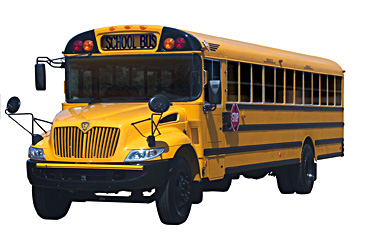Iowa State researchers and two Iowa school districts to test hybrid school buses
08-03-06

This is a hybrid school bus similar to the two coming to Iowa school districts. Photo by the IC Corp.
Contacts:
Dennis Kroeger, Center for Transportation Research and Education, (515) 296-0910, kroeger@iastate.edu
Jim Walker, Nevada Community School District, (515) 382-2783, jwalker@mail.nevada.k12.ia.us
Rich "Scottie" Scott, Nevada Community School District, (515) 382-4067, rscott@mail.nevada.k12.ia.us
Todd Abrahamson, Sigourney Community School District, (641) 622-2025, abrahamsont@aea15.k12.ia.us
Mike Krapfl, News Service, (515) 294-4917, mkrapfl@iastate.edu
Iowa State researchers and two Iowa school districts to test hybrid school buses
AMES, Iowa -- They'll look like any other Iowa school buses. But two big yellow buses coming to the state later this school year might get 40 percent better mileage. And their emissions of particulate pollutants might drop by 50 percent.
So what makes these buses so special?
Look under the hoods and you'll still find big, V-8 diesel engines capable of bringing 65-passenger buses to highway speeds. Look a little closer and you'll also see electric drive trains capable of moving the buses from stop to stop at street speeds while capturing the energy of braking to recharge their own batteries.
These will be hybrid school buses. And the ones coming to the Nevada Community School District in central Iowa and the Sigourney Community School District in southeast Iowa will be among the first 19 in the country.
Researchers at Iowa State University's Center for Transportation Research and Education have been working for two years to bring the hybrid buses to Iowa. Dennis Kroeger, a transportation research specialist for the center, is hoping the buses will be picking up students sometime late this year. And when they do, center researchers will be evaluating the buses for performance, fuel efficiency and emissions.
"I'm excited about this," Kroeger said. "This is a perfect application for this technology. Buses operate at low speeds. There's a lot of stop-and-go driving. And so it makes sense to use a lot of these buses. I think there is a market for this."
But hybrid electric school buses are new and expensive -- currently about $200,000 per bus. The Nevada and Sigourney districts have agreed to pay $60,000 for the hybrid buses -- the cost of a standard school bus. Kroeger has secured grants to pay for the additional costs of the buses and for studies of their performance: $194,000 from the Iowa Energy Center based at Iowa State, $120,000 from the New York State Energy Research and Development Authority and $83,000 from the Iowa Department of Natural Resources and the School Administrators of Iowa.
"Rising transportation fuel costs are having a huge impact on already tight Iowa school budgets," said Floyd Barwig, the director of the Iowa Energy Center. "Our grant will put Iowa at the forefront of benefiting from a national project."
Advanced Energy, a nonprofit corporation based in Raleigh, N.C., is leading a larger effort to bring the country's first 19 hybrid school buses to school districts in Arkansas, California, Florida, New York, North Carolina, Pennsylvania, South Carolina, Texas, Virginia, Washington and Iowa. The buses will be built by the IC Corp. and equipped with an Enova Systems Inc. hybrid electric drive train.
"I do think this is a great idea," said Todd Abrahamson, the superintendent of Sigourney schools. "This is a way to cut down on emissions and provide better safety and efficiency. With the high cost of fuel, I see this as a big money saver and something good for our district."
Jim Walker, the superintendent of Nevada schools, said a hybrid bus is a natural for the Story County community. Nevada, after all, is home to two wind turbines that generate electricity for school buildings, the Iowa Energy Center's Biomass Energy Conversion Center and the new Lincolnway Energy ethanol plant. The school district has also been running blends of biodiesel in its fleet of buses since 2001.
"The community has a strong interest in the environment and finding ways to maximize resources," Walker said. "And there's a strong interest in this community to look at transportation alternatives. We need to look at ways to cut down on emissions and utilize another source of energy."
Rich "Scottie" Scott, the director of transportation for Nevada schools, said the district will give the hybrid bus a good test this school year. It will run about 70 miles a day on a route that includes stops in town and in the country.
Scott said he took a hybrid city bus for a test drive last summer and was very impressed with the mix of diesel and electric power.
"It drove really well," he said. "It was a super nice combination."
-30-